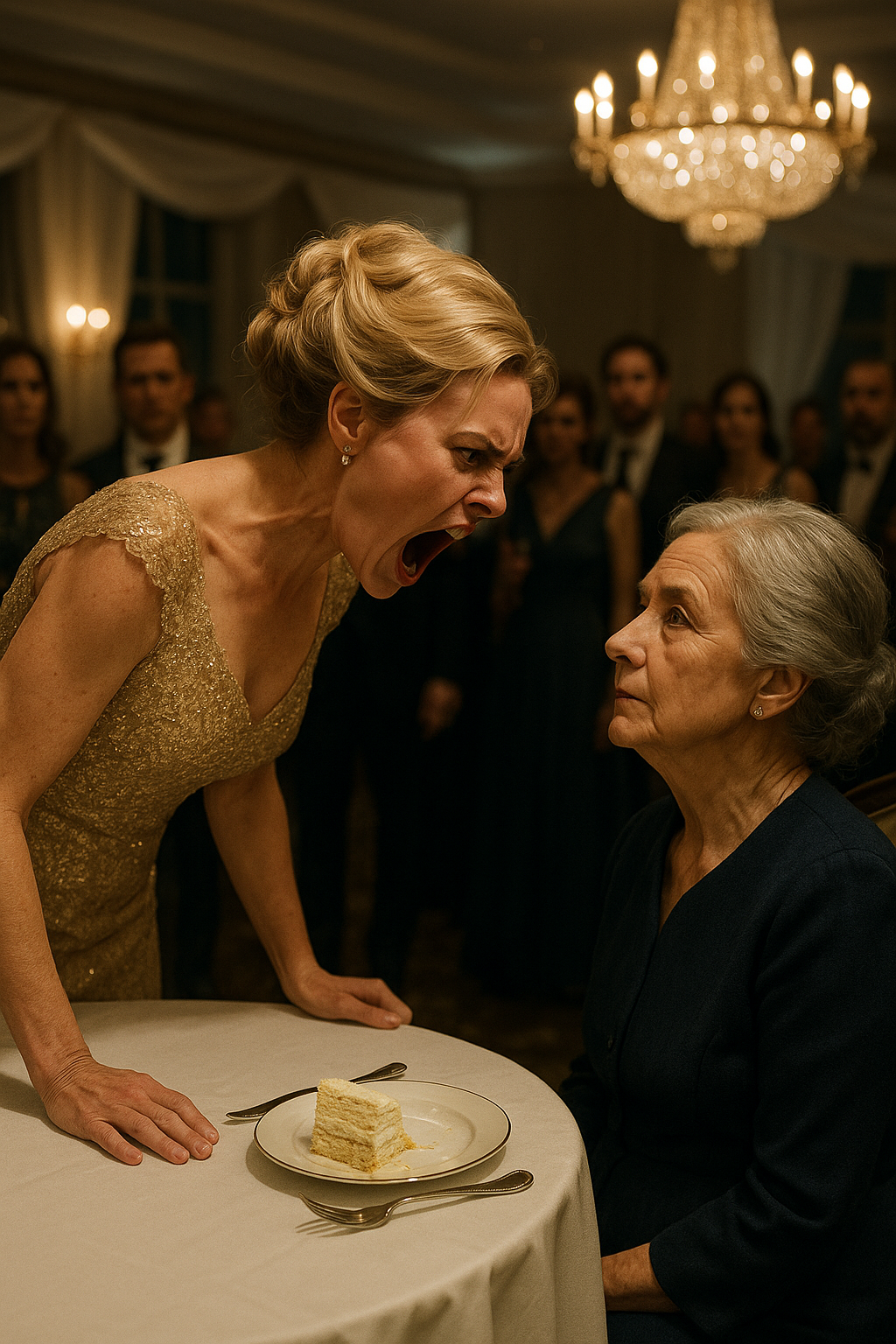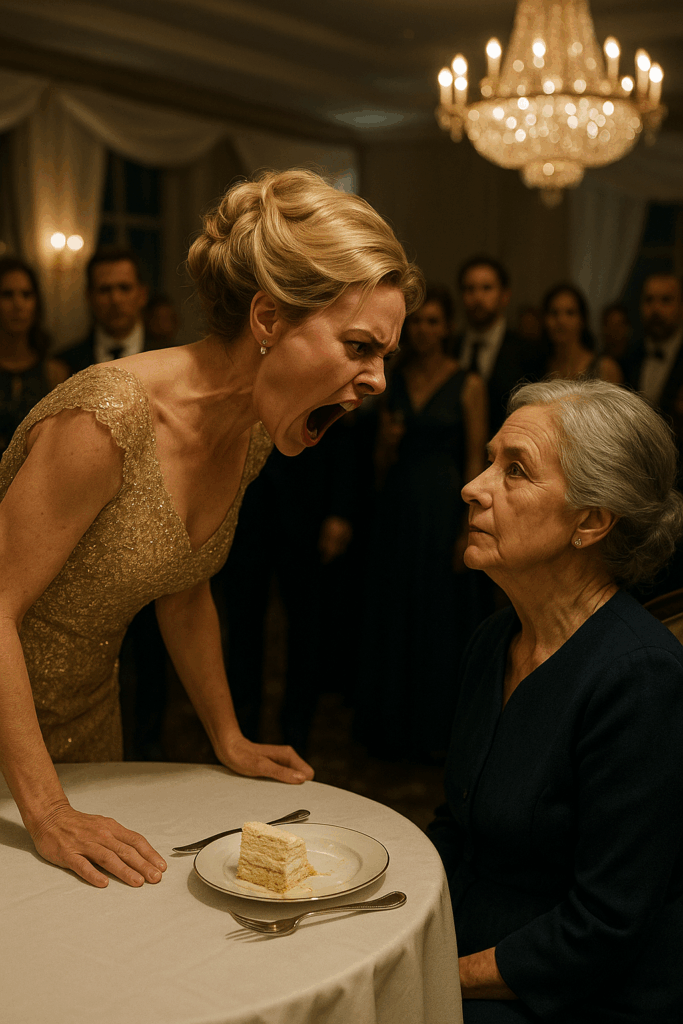They Seated Me at the ‘Poor Aunt’s Table.’ I Smiled, Knowing I Owned the Company Running the Wedding —and Before the Night Ended, Everyone Learned Why You Should Never Humiliate the Help.
The ballroom smelled like white roses and money.
The kind of scent that clings to silk gowns and old money names.
It was beautiful — and utterly hollow.
When I walked in, heads turned. Not because they recognized me, but because I didn’t fit their picture. My dress was simple. My jewelry quiet. My confidence invisible — the kind that doesn’t need to be seen to be felt.
I was Aunt Nora.
The “poor aunt.”
The relative everyone pities but never helps.
Margaret Langford — the bride’s mother — met me at the door, her smile painted on like stage makeup.
“Nora, dear. You made it!” she trilled. “We were worried the drive from… well, your neighborhood might be too much this time of year.”
Her hand brushed the sleeve of my dress — soft pity disguised as affection.
I’d seen that move before.
It’s how people like her make cruelty look elegant.
“I wouldn’t have missed it,” I said. “It’s a lovely venue.”
“Oh, it’s the best,” she said proudly, eyes sweeping the golden chandeliers. “We spared no expense. You’ll see why we’re known for doing things properly.”
Then she turned to the event planner — a woman in a headset, juggling last-minute calls — and said, “Please seat Ms. Brennan at Table 27. By the service doors. It’s cozy.”
Cozy.
The word landed like a slap.
She could’ve said “forgotten,” and it would’ve meant the same thing.

The Corner Table
Table 27 sat half in shadow, half in the smell of the kitchen. The hum of a refrigerator competed with the music from the ballroom. It was where they put extra napkins, tired relatives, and social outcasts.
I sat down, smiled politely at the elderly uncle beside me, and watched.
Not out of bitterness — but calculation.
Because what Margaret didn’t know was that this entire wedding — every flower, every candle, every shimmer of gold — had been orchestrated by me.
I was Nora Brennan, founder and CEO of Aurelia Events, one of the most sought-after luxury event firms on the East Coast.
Margaret had hired my company through an associate. She’d never met the owner — the mysterious “N.B.” who only dealt through senior coordinators.
She didn’t realize the “poor aunt” she’d seated by the kitchen was the architect of her perfect world.
Dinner was served — filet mignon with truffle butter and hand-glazed vegetables. The kind of meal that costs more per plate than my first month’s rent years ago.
Margaret floated from table to table, basking in compliments. When she reached mine, her lips pursed slightly — as if she’d stepped in something unpleasant.
“Oh, Nora,” she said brightly. “I hope they’re taking good care of you down here. We didn’t have much space closer to the front, you understand. The important guests filled up the main tables quickly.”
I smiled up at her. “Perfectly fine, Margaret. It’s nice being near the action.”
Her eyes flicked toward the kitchen door. “Of course. Well… enjoy the view.”
And she walked away, laughing softly with a group of her friends.
My nephew, Ethan — the groom — caught my eye across the room. He looked uncomfortable. He’d tried to intervene during the seating chart discussion, I knew. But Margaret ruled her household like she ruled everything: through embarrassment.
I gave him a small nod, telling him it was okay. Because in that moment, I realized something — this wasn’t humiliation. It was opportunity.
The Calm Before the Toast
Hours passed. The band played Sinatra. The guests danced. The champagne never stopped flowing.
And yet, I noticed things — the tiny cracks only a professional eye could catch.
A light flickering.
A curtain rod slightly off-center.
A server hesitating before serving the wrong wine to the wrong table.
Margaret, of course, noticed none of it.
She was too busy being adored.
But for me, every small flaw was a thread — and I had my hand on the end of it.
I pulled out my phone under the table and sent a message to my operations director, Mia.
M: She’s done it again. Full clause 12 enacted.
N: Confirmed. Proceed quietly.
The Toast That Broke the Room
The lights dimmed.
Margaret ascended the small stage, her sequined dress shimmering under the chandeliers. The microphone squealed before the band cut the sound down to silence.
“Friends and family,” she began, voice dripping champagne confidence. “What a night, hmm? A celebration of love, of family, and of — let’s be honest — impeccable taste.”
Polite laughter rippled through the crowd.
She raised her glass. “And none of this would’ve been possible without the extraordinary talents of Aurelia Events — the best in the business! Their work tonight is simply flawless.”
Applause. Flashbulbs.
And from Table 27, I smiled.
Because I knew what was coming next.
You see, my contracts always include a line buried in the fine print — Clause 12a: Professional Dignity.
It grants me full termination rights if a client “publicly demeans or disrespects any member or representative of Aurelia Events.”
And Margaret Langford?
She’d done that twice. Once at the door. Once at dinner.
In front of witnesses.
So while she basked in applause, I sent another quiet text.
M: Execute clause.
N: Confirmed. Begin phase two.
The Unraveling
It started with the candles.
One by one, they flickered out — not all, just enough for guests to glance around in confusion.
Then, the music stopped mid-song.
The waiters disappeared, trays vanishing with them.
The bar lights dimmed.
At first, people thought it was a power glitch.
Then came the whispers.
“Where’s the staff?”
“Did something happen?”
“Why is the dessert table gone?”
Margaret’s laughter faltered. “What’s going on?” she snapped at no one in particular. “Someone fix this!”
I stood up slowly, smoothing my dress.
The entire room had turned to murmurs. The illusion was crumbling.
I walked toward her, calm as a priest at a funeral.
“Mrs. Langford,” I said softly, stopping a few feet away.
She turned, startled. “Oh—Nora. Do you know what’s going on? The staff—”
“They’ve been dismissed,” I said. “Effective immediately.”
She blinked. “Dismissed? By who?”
“By me.”
I met her eyes. “Nora Brennan. Founder and owner of Aurelia Events.”
The color drained from her face. “You’re joking.”
“I’m not.”
Gasps rippled through the crowd. Ethan, the groom, stood frozen behind his mother, disbelief and relief warring in his eyes.
“I’m terminating the contract,” I continued. “As per Clause 12a. You violated the terms by publicly humiliating a representative of Aurelia Events — twice. Once at the entrance, once at dinner.”
Her voice cracked. “You can’t—this is my daughter’s wedding!”
“And it’s still beautiful,” I said gently. “But beauty means nothing without respect.”
I stepped closer, my tone soft but sharp. “You thought I was beneath you. That your money could buy manners, or decency, or class. But all it bought you was a reminder that the people you look down on are the ones holding your world together.”
The Aftermath
The next minutes were chaos. Guests whispering, the band packing up, the lights fading to half-glow.
But amidst it all — silence from the bride.
Then, softly, she spoke. “Mom,” she said, her voice trembling. “What did you do?”
Margaret’s lips parted, but no words came. The crowd parted like a tide, leaving her standing alone under the chandelier — the queen stripped of her crown.
I turned to leave, but Ethan stopped me. “Aunt Nora,” he whispered. “Thank you.”
“Take care of her,” I said, nodding toward his bride. “And remember — love doesn’t need chandeliers.”
Two Weeks Later
A letter arrived.
Handwritten.
From Margaret herself.
Nora,
I’ve been angry my whole life, and I don’t even know why. Maybe because kindness doesn’t make people listen — power does. But that night, you took my power away without raising your voice. You made me see myself through others’ eyes, and it broke something in me I didn’t know needed breaking.
I hope my daughter becomes more like you than me.
Margaret.
I sat there a long time, holding that letter, unsure whether it was apology or confession. Maybe both. People often say revenge feels sweet.
It doesn’t.
It feels quiet.
Like closure finally taking a breath.
Because it was never about humiliating her — it was about restoring balance.
And sometimes, the loudest justice comes from silence: a room dimming, a crown slipping, and a woman finally realizing that the help was the one helping her all along.
Now, every time I walk into a ballroom, I glance toward the far tables — the ones by the kitchen, by the noise, by the shadows — and I wonder:
How many of us are still sitting there, waiting for the moment we finally stand up and remind the world that we built the stage they’re standing on?


